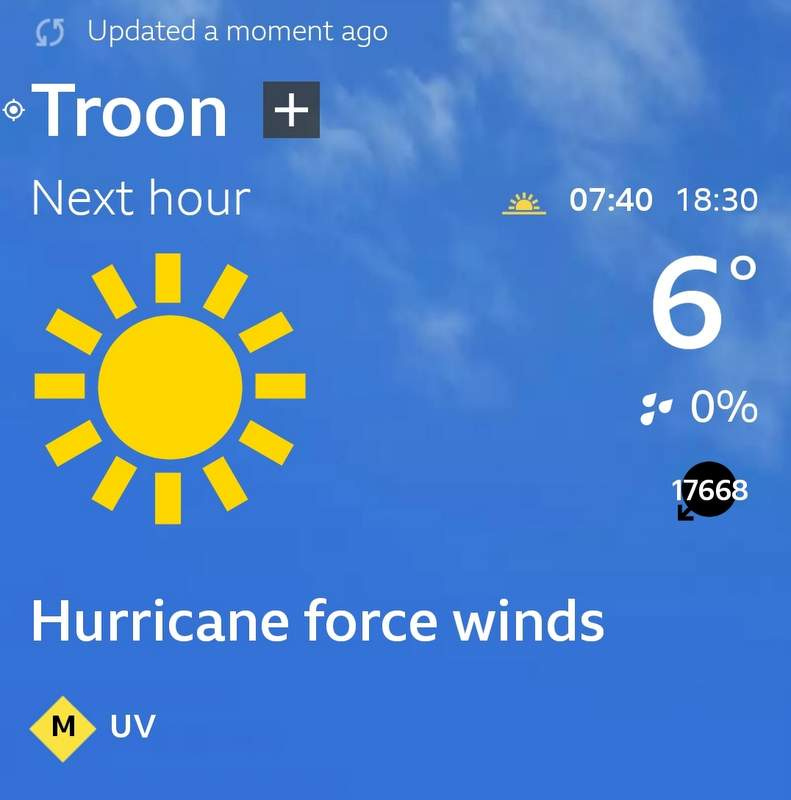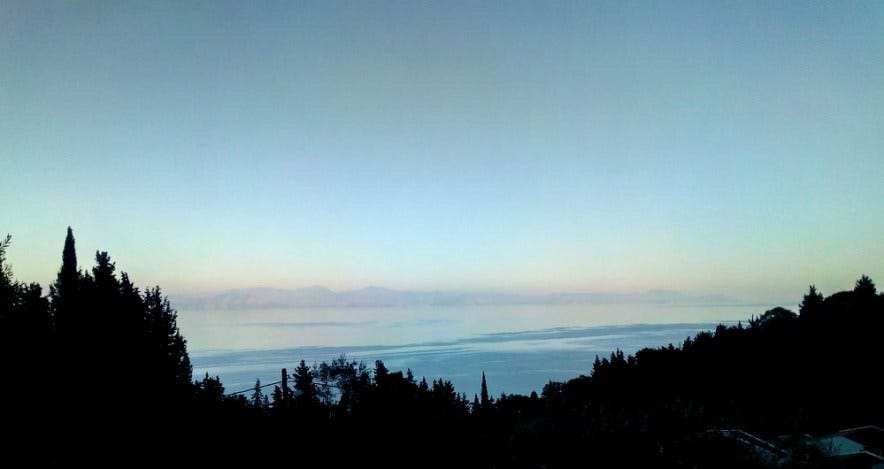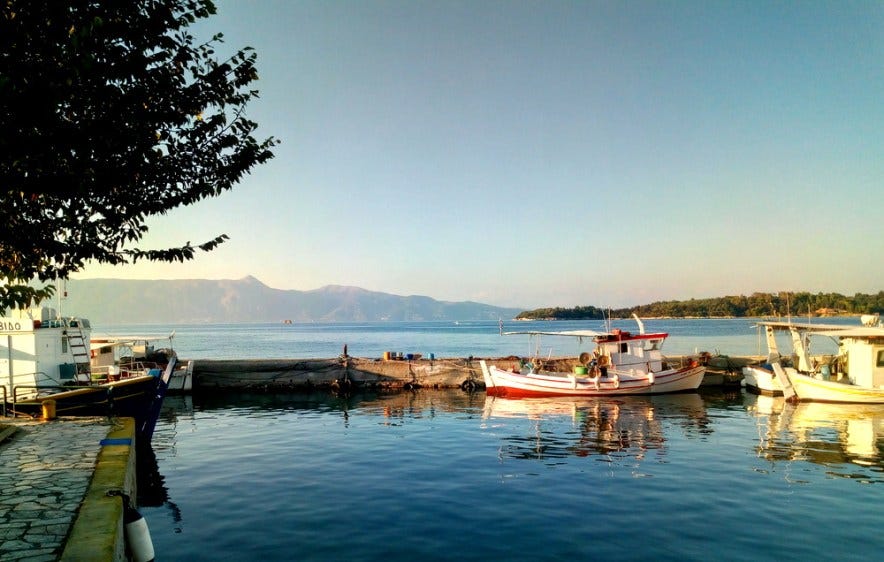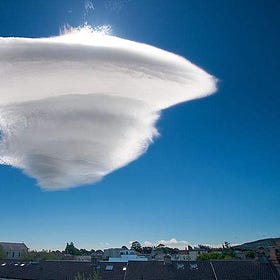Hey, wait. Where did everyone go?
Bewildered, I walk the whole length of the beach front. Every single restaurant is shut, with the chairs gone and the tables stacked to one side. The shop fronts are now hidden behind metal or plastic shutters, the gates shut and padlocked. The café where I had my morning coffee yesterday is closed, as is the taverna with the blue Gingham tablecloths where I had a moussaka the day before yesterday that was so good I almost wept. All its outdoor furniture is gone, and a sign on the door says “opens in Spring” in Greek.
It’s the third week of October, 2019. I still have another month to go in this seaside resort - but literally overnight, half of Corfu seems to have shut for the winter. Or gone on holiday. Or - what is actually going on here?
Apart from a few fellow tourists drifting around in mild shock (“what’s happening?”, “I don’t know!”), hardly anyone is about. The crowds have been slowly thinning over the last few weeks, but you wouldn’t know it from how enthusiastically OPEN!!! everything has been. Waiters and café owners have done their very best to get me to sit down, please, have a beer, are you enjoying Greece, are you English or American? Ah yes, ‘Yorkshire’ - Jeremy Clarkson! He is very rude about Greece, but still very funny! Also the bread is free if you order something. You have to order something please.
The beach has emptied too. I’m the only person going for a swim today, in water still as warm as a recently-run bath.
Wandering mournfully back to my apartment up on the hillside, I spot a waiter who served me a kebab last week. Γειά σας! Yes, it’s all closed now, the winter has come and nothing will open again until March. He sees me eyeing the baking hot, cloudless blue sky. Yes yes but tomorrow or the next day, big storms, lightning! Dangerous to go walking. Buy your food from Kavalieratos, he never closes. Good luck!
I suspect I’m being had. This can’t be real. Oh come on, weather doesn’t work like that! This must be some kind of trick they play on tourists, like Scots claiming that a haggis is a small hairy creature that gets trapped on hillsides because its legs are shorter on one side than the other.

A day later, when the skies open and a vertical sea falls out of them, I’m struggling up the hill with a backpack of shopping. It’s noon, but the sky is black with cloud and falling rain, and as I collapse drippily through my apartment’s front door, thunder starts to rumble in the distance.
For the rest of the day I watch in fascinated horror as lightning stabs down on the town below, once hitting a metal rooftop with an audible CLANG. It never stops raining, and at night through gaps in the downpour, I watch the clouds out to sea flicker with ghostly light…
I was wrong. This is exactly how the weather works, as predictable as clockwork, give or take a few days, and eastern Corfu has calibrated its entire tourism industry around it. I might have know this if I’d spent time talking to anyone, but I’ve been too self-absorbed, too wrapped up in recovering from the exhaustion that drove me here, after the gruelling process of selling my family home. I never asked, so I never learned.
(Hey, I think to myself at one point: you know what might be a fun newsletter, maybe on that platform called ‘Substack’ that I’ve been reading so much about? Something about curiosity, asking better questions, learning stuff I never knew, including about the weather. Would that even work?)
This morning (here in 2024), I am startled to see the BBC Weather app forecasting this for my corner of Scotland:

Considering that 17,668 miles an hour is upwards of Mach 23 and my house is still standing, I presume something is a little awry - and then it refreshes:

You don’t say! (Update: oops.)
But this got me thinking: what is the fastest windspeed that could exist on this planet?
Five years after my time in Corfu, and after six seasons touring my own endless ignorance about science and how the world works, I still don’t know much about how our atmosphere works.
Clouds, for example!
It's Only A Cloud (But Hey, *What* A Cloud)
Hello! This is Everything Is Amazing, a newsletter about science, curiosity and wonder.
While writing that piece, I knew that clouds were frequently mistaken for flying saucers, space lasers, politicians doing geoengineering and other fevered notions, but how they actually worked was all new to me - and still is.
Do you know how much clouds weigh? How fast can they travel? Did you know that tiny organisms appear to be living in them? (It’s true.)
But it’s not just clouds. For starters, do you know how big the sky is? As in: how far it goes up? I recently learned that space begins around 100 kilometres (62 miles) above our heads - so, is that where the atmosphere ends?
Not quite, in fact. According to NASA, to fully leave the Earth’s atmosphere, you’re going to have to travel another 9,900 (!) kilometres - and isn’t that interesting, and also rather baffling? What does that statement even mean?
There’s so much to learn about the invisible sea we live at the bottom of, which we breathe in and out of our bodies 20,000 times a day. The sky isn’t just a passive backdrop to our lives down here on solid ground - and it’s not just something to be terrified about when it roars out of control as it’s increasingly doing these days, as evidenced by the last 24 hours in Florida. It’s also within us, and part of us, and we resonate to its changes in ways that medical science is just starting to understand (like how, as I said here, a healed bone can ache with a change in local air pressure).
What about those of us who live further up in the atmosphere, including the roughly 81 million of us living above the 2,500m mark? From a scientific perspective, how do people adapt to life at high altitude when it can be such a struggle for the rest of us? What can that tell us about how the humans of the future might adapt to life on other planets?
My questions are endless:
How come snow isn’t white, that wind is silent and that you can’t actually smell rain (which doesn’t contradict what I wrote here)?
Why are snowflakes so predictable in their shapes that some people have written catalogues of them? What’s the science - or more correctly, the mathematics - behind those shapes?
Why is snow regarded as so much fun, and yet rain as so much hell-nope? (Disclaimer: I love both.)
There’s certainly a season’s worth of rabbit-holes to scurry down here, so that’s what I’m doing for the next season of this newsletter.
It’ll also be a shorter, tighter, more focused season - and the reason is what’s happening in the world right now.

The longer you write a newsletter like this one, the more danger there is that you start to think you know stuff and consider yourself a legitimate source of opinion.
Knowing how wrong I’ve been in the past about all sorts of things, I’m wary of assuming I have much in the way of answers. Instead, from the beginning of Everything Is Amazing, I’ve tried to position myself as an enthusiastic student who is focused on asking interesting questions and passing along credible, fact-checked scientific explanations of the everyday wonders around us that so many of us are hardly aware of.
(Seriously. As of a few days ago I am 53 years old, and yet I still don’t know how fresh air actually works? What have I been doing for the last half-century? Madness.)
Part of my intended role is to be a knowingly useful idiot to hard-working scientists, creative artists and thinkers of all kinds (and to remember how much all those categories can overlap, too).
But it’s also to serve you with something that’s worth reading. It’s to make you go “wow” as much as I did when I filled a gap in my knowledge with something amazing. It’s to give you a tiny but meaningful moment of revelation and awe - not just the enormous, worldview-toppling kind, but also those tiny wow-moments that
calls enchantment - the result of “a commitment to practising awe, to committing our attention to the world around us, and learning to feel its tingle of magic.”If I can somehow be part of the ecosystem of writers who are sprinkling a little awe on you as you race past to rugby-tackle the stresses of your day, and in doing so I can give you a tiny jolt of hope (which is what happens when you realise the world is a tiny bit more interesting than you ever expected), I think this newsletter is serving a good purpose…
Especially right now.
There’s a really important election happening across the Atlantic in a month’s time. There’s what is happening in the Middle East, and in Ukraine. There is what’s going on with the global climate, and all the knock-on effects of it. There’s always something (see: life), but right now it particularly feels like a lot.
I don’t write about those things - not directly, anyway. It’s not that I don’t care about them (quite the opposite) but I don’t even know enough to write about them as a student, let alone contribute to the well-informed conversations being had around them.
But I can do this: I can make you go “wow”, and I can make you curious about something you never knew anything about - and maybe I can introduce to you the subversive and intoxicating idea that many of the things worth knowing in this life are ahead of us, not behind us.
However, I’m also a writer still trying to discover if that newsletter idea I had in Corfu really will work in the long run, and hoping that enough people would want to support it to keep it going - so it’s a bit alarming that recently this has been happening behind the scenes:
When the graph like this is going down, you know there’s some momentum you need to recover. 😬
Part of that has been due to my health issues over the last year, forcing me to throttle back and put a few things regarding this newsletter on pause (more about that next time) - but now I’ve got the all-clear, I’m confident I can get everything back up to speed again.
I’m incredibly grateful to everyone who has been generous enough to support this project so far, some of you from the very beginning (words fail me here - thank you so much, you guys) - but I’m still hoping that a few more of you who have read the free version of this newsletter will conclude it’s worth supporting with a paid subscription.
If just a few dozen of you decided that was true, I’d get back to where I was - and then everything else would feel possible again.
Could you help me do this?
With that in mind, for the next few days & until the end of Tuesday, all paid subscriptions are 20% off - and that’s recurring, for as long as you wanted to stay signed up:
I’d be so grateful if you wanted to come on board.
Thank you so much!
- Mike





Hi Mike, I’m an American for better or worse, and sadly one of the things that makes me say “wow” on a regular basis is the seeming idiocy of some of my fellow Americans. I much prefer to be amazed by clouds, to be honest, but the stupid here is really overwhelming right now. People are threatening meteorologists because they think the meteorologists are causing the hurricanes. No really, it’s true. We have shocking levels of stupid.
Anyways, I wanted to say thank you for giving me some better things to be amazed at. Thank you so much. I wish I could do another subscription right now. If you add a PayPal link, you might get some people who can donate occasionally who aren’t able to subscribe.
this newsletter was one of my first substacks and is so inspiring and thought provoking always. I love and adore your curiosity about the world Mike and am so pleased that you're feeling better and looking forward to more